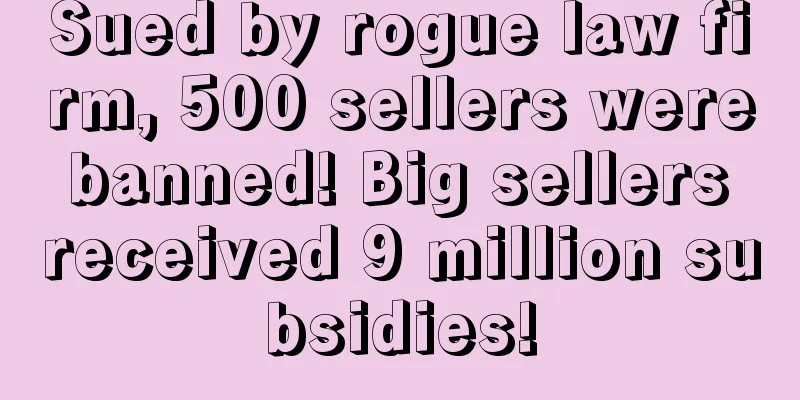|
After half a year of fluctuations, the peak season for the cross-border e-commerce industry in the second half of the year is about to begin. Now, with only 15 days left until Prime Day, Amazon’s first big promotion in the second half of the year, the sudden platform misjudgment storm has once again caught cross-border sellers off guard. As we all know, restricted products refer to the types of products that require Amazon's pre-approval before sellers can list them. As Amazon strengthens its compliance requirements, sellers need to know more clearly which products are restricted from selling on Amazon, and how to apply for sales approval, so as to ensure that their business can run normally on Amazon. However, recently, a large number of listings selling non-restricted products have been misjudged . It is learned that on June 29, a large number of sellers reported that they received performance notification emails from Amazon. The email mentioned that the products in the relevant listings were determined to be living plants or seeds . Publishing these products that do not belong to the relevant categories violated Amazon policy. Sellers must take remedial measures before July 1 , otherwise their ASINs will be deleted by Amazon. ▲ The picture comes from the seller’s disclosure According to most sellers who received the email, their products had nothing to do with live plants or seeds , but were suddenly identified as restricted products and were required to submit appeal information: "100 links were also judged as seeds, in the clothing category." "I sell industrial machinery products, which have nothing to do with seeds and plants. It is most likely a misjudgment." “Flax sellers all over the world are being judged as seeds. I don’t know what bug has happened to the system.” According to feedback from sellers, products that were judged as live plants or seeds include clothing, glasses, toys, auto parts, 3C and other categories, which have a wide range of impacts and have sparked heated discussions in domestic and foreign forums. As of early June 30, the number of listings that received such performance notifications continued to increase. ▲ The picture comes from the Amazon forum
Among them, one seller had tens of thousands of listings that were misjudged. According to reports, he had four parent entities, each with 4,000 child entities. When all were counted, the number of restricted links reached over 10,000 . ▲ The picture comes from the seller’s disclosure In this regard, some sellers speculated that the listings triggered a sensitive word in large quantities, but the vast majority of sellers believed that this was a large-scale misjudgment caused by Amazon's strengthening of the review mechanism for detecting restricted products . Since Amazon required sellers to take remedial measures before July 1 in the email, otherwise the listings would be deleted, and June 29th to 30th fell on the weekend, customer service and related personnel responded slowly, and a large number of sellers who were unable to obtain relevant replies in time felt very anxious. However, we learned that some misjudged listings have returned to normal and their performance has disappeared. It is reported that since the afternoon of June 30, sellers have reported that the misjudged listings have returned to normal . ▲ The picture comes from the freight forwarder’s revelation For some sellers, their performance disappeared only after they successfully submitted an appeal , while for other sellers, their listings were automatically restored without them filing an appeal . According to the reply received by a seller who opened a performance case, customer service said: This problem is widespread. The seller only needs to clearly state the type of product when submitting the complaint, that it is not a living plant, and then attach product copywriting and other information. The seller inferred that since a large number of listings were misidentified as restricted products mainly due to Amazon's system problems, any appeals made by the relevant sellers would generally be approved quickly. If they are not in a hurry, they can also wait for Amazon's technical staff to fix it later. Currently, according to seller feedback, the following methods have been verified to successfully pass the appeal: 1. Submit a complaint in the backend: explain what type of product it is, and that it is not a live plant or seed product, and attach supporting materials; 2. Open another English email case: Submit the product pictures, A+, copywriting and other supporting materials of the problematic ASIN as attachments to the case. 3. Note: POA and attached documents must be submitted in English. Materials to be provided in the appeal: POA: State the product listing time, order data, actual product information, etc., and emphasize that the product is sold in compliance with regulations and is not a living plant; Physical product images, product instructions, and comparisons between the actual product and live plants or seeds; If you have an invoice and brand certificate + brand holder information + store business license, you can also submit them together.
As of press time, most of the misjudged listings have been automatically restored. If some sellers have not yet been restored, they can also try the above method to appeal and speed up the recovery.
Now that it is the eve of Prime Day, Amazon's review has become more stringent. We would like to remind everyone to pay more attention to the changes in the background and ensure that the listing complies with Amazon's policy requirements , avoiding sensitive words and restricted products, to ensure that the account can sell normally when Prime Day comes.
Have you encountered any other abnormal situations recently? Welcome to discuss in the comment area~
|










